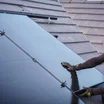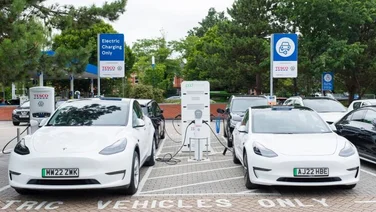- Upfront costs holding back roll out of solar panels
- A family with a 3kW system could save up to £440 a year
- A key barrier to uptake is the upfront cost

Rooftop solar panels could cut household energy bills by almost a quarter, but millions could be missing out due to large upfront costs, according to new research published by the Resolution Foundation.
The research, which analysed the government’s proposed ‘rooftop revolution’, found that a family with a 3 kilowatt (kW) solar panel system could save up to £440 a year by cutting their bills and reselling excess energy back to the National Grid.
Zachary Leather, economist, Resolution Foundation said that for the 3.6 million ‘fuel poor’ families – those who spend over a tenth of their disposable income on energy bill – the savings from rooftop solar panels could reduce bills by 24%, providing “much-needed relief” to many.
“Rooftop solar offers a return on investment comparable with many common ‘green’ home upgrades,” Leather said.
“Solar – at 7p a year return per pound spent – measures up to cavity wall insulation (5p a year) and double-glazing (3p a year), although specific households’ circumstances will vary.
“But despite the high potential savings, fewer than one-in-10 (8%) roofs have solar panels installed, compared to almost 72% cavity-walls filled,” he said.

Get free solar panel quotes
Answer a few quick questions, and our trusted installers will send you bespoke solar panel quotes – for free.
The report said that a key reason for poor take-up is the high upfront costs. A 3kW solar panel currently costs around £6,500, approximately £5,500 more than average household savings.
Leather added that poor take-up has been “compounded by reductions in government support,” which have further “locked poorer households out of accessing solar panels”.
“Back in 2015, more solar panels were installed in the poorest areas than the richest, but by 2023, solar panels were more than twice as likely to be installed in the richest neighbourhoods than the poorest ones,” he said.
To address this, the Foundation said policy makers should consider offering means-tested grants or loans to cover upfront costs and ensure households are given a fair price for any excess energy produced.
The report noted that successfully rolling out rooftop solar panels to lower-income households could lift as many as 1.2 million families in Britain out of fuel poverty and help to decarbonise Britain’s electricity at the same time.
Leather said that despite the benefits that “too few families, particularly in poorer areas are getting them installed, and called for more government action.
“The government should include a new means-tested support scheme for solar panels in the upcoming Warm Homes Plan.
“This could really get the ‘rooftop revolution’ up and running and ensure the consumer benefits from this net zero transition are not just hogged by richer households.”
Since the turn of the year there have been reports that the government is set to increase the amount available for solar panels and other low-carbon technology, as part of its net-zero plan.
Reports in January suggested that ministers might announce a further £6bn for clean tech funding in the next Spending Review, set for the Spring.






